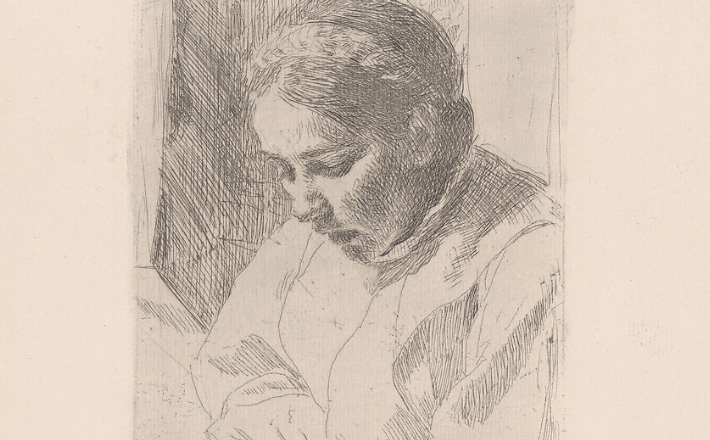Commentary on Luke 11:1-13
Francois Bovon once remarked, “The Lord’s Prayer belongs to us and yet escapes us.”1 Few words are more familiar to Christians across traditions than this prayer Jesus teaches in Luke 11. And yet, for all its familiarity, the prayer can be elusive in meaning and difficult to embody. What does it mean to really pray this way? And why, in the middle of Jesus’ journey to Jerusalem, does Luke choose this moment to slow the story and focus on prayer?
Prayer has already played a large role in Luke’s Gospel by this point in the story. We have already been given several scenes in which Jesus himself is praying. For instance, in both the account of Jesus’ baptism (Luke 3) and the account of Jesus’ transfiguration (Luke 9), Luke inserts the detail that Jesus was praying before the event occurred, which the other gospel accounts don’t mention. In fact, by Luke 11, Jesus has already been featured praying in five separate accounts (Luke 3:21; 5:16; 6:12; 9:18; 9:28). Thus, it does not seem surprising that the disciples would notice this rhythm and ask Jesus to teach them how to pray.
Jesus responds in two parts. First, he gives them the prayer itself, and then he shares stories that illustrate God’s character and highlight the “why” behind our praying. These two sections are so familiar that we often move past them quickly. However, both are central to understanding what Luke is teaching about how and why we pray.
How we should pray: The Lord’s Prayer
Luke’s version of the Lord’s Prayer is spare and to the point, less liturgical and more direct than Matthew’s version. It is stripped down to the most essential parts:
“Father, may your name be revered as holy.
May your kingdom come.
Give us each day our daily bread.
And forgive us our sins,
for we ourselves forgive everyone indebted to us.
And do not bring us to the time of trial.” (verses 2–4)
By addressing this prayer not to God or YHWH but Father, Jesus here emphasizes God’s relationship with his people, not as subjects or as a faceless mass, but as children. Jesus then offers four requests: a request for the kingdom to come, a request for daily bread, a request for forgiveness, and a request for deliverance. In other words, in this prayer, Jesus summarizes all the things we need most when we come to God: God’s presence, our needs met, forgiveness, and salvation.
Jesus does not present this prayer as a magical formula or as the only acceptable prayer. Instead, he offers it as a framework, one that is rooted in trust and dependence on the Father. It is simple, accessible, and theologically rich. This is not just a prayer to recite. It is also a way to live before God.
Why we should pray: A Father who gives good gifts
Jesus then shifts from how to why, telling two brief parables. In the first, a man knocks on his friend’s door late at night, asking for bread. In the second, a parent gives good gifts to their child. These images draw our attention not to our technique in prayer, but to the One who hears those prayers.
We see here that Jesus wants his followers to be persistent in their prayers. Like the man who knocks on his friend’s door in the middle of the night asking for bread, we should keep on knocking until the door is opened to us. Luke will return to this theme in Luke 18 with the Parable of the Persistent Widow, when the widow wins justice from an unjust judge by refusing to relent from her requests.
Jesus tells his disciples to ask, to seek, and to knock, trusting that God will answer. God is better than a reluctant friend who finally opens the door just to stop the knocking. And God is even better than the best earthly parent who knows how to care for their child.
Of course, this brings us to a tension that Christians have wrestled with throughout history. Not all prayers are answered in the way we hope. Even in the third century, Origen preached about why some prayers remain unanswered (Homilies on Luke, Fragment 183).
Luke acknowledges that we can pray for both spiritual needs and everyday concerns. However, we are not to pray for things that violate the spirit of the Kingdom, such as unjust gain or harm to others. And we do not know when or how our prayers will be answered. Still, Luke offers reassurance. We do not pray because we know the outcome. We pray because we trust the One who hears us.
This is why Jesus calls us to keep seeking. In the very act of searching, we acknowledge that there is someone to be found—someone who loves us deeply, like how a father loves a child.
Preaching the mystery
For preachers and teachers, this passage offers both a gift and a challenge. It reminds us that prayer is not primarily about results, but about trust. Not about saying the right words, but about staying in relationship with the One who loves us. We knock because we believe someone is listening. We ask because we believe the Father loves us as children and that the good gift of the Holy Spirit is ours.
The Lord’s Prayer may be familiar, but it still invites us into mystery. It belongs to us, and yet it escapes us.
And maybe that is the point.
Notes
- François Bovon, Luke 2: A Commentary on the Gospel of Luke 9:51–19:27, Hermeneia (Minneapolis: Fortress, 2013), 81.


July 27, 2025